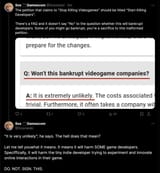>>715591521 (OP)
I'm new to this issue.
As I read it, the people who play online games want to be able to play those games whenever they want, for as long as they want. The thinking being that they made a purchase, and that purchase entitles them to access their property whenever they see fit.
Also, as I read it, the people that MAKE online games, want to be able to eventually unload from those games. They want to be allowed to move on, to use company resources, time, personnel, infrastructure to chase other ideas, other stories, other demographics, other opportunities. Being legally handcuffed to an IP for all of time immemorial forever and ever because someone made a purchase is their idea of "a bridge too far".
Both of these things can be true, and both can be valid. There's no room to grow or change or invest or improve if you're legally mandated to do the same thing over and over for a pool of diminishing returns. There's also no keepsake or preservation or trophy owning of treasured times and achievements if someone can just flip a switch and make it all go away.
Surely there's some middle ground. I admit that it's no longer 1999, and all my friends aren't high school teenagers playing StarCraft on blizz anymore. Times have changed. It's been 26 years. We're triple the age now. We got jobs and kids. I don't expect those same servers to be running forever. A reasonable amount of time has passed. The flash in the pan is over. They got their money, I got my monies worth.
But this nonsense about developing a game for ten years, to sell an unfinished game on Day One, to sell the finished product as DLC/battle pass/season packs, and take the money and run after a year or two is scummy of the highest order.
Maybe we make a rule: live service for a game must survive as long as the generation of console it was released for does. That sounds fair to me.







































